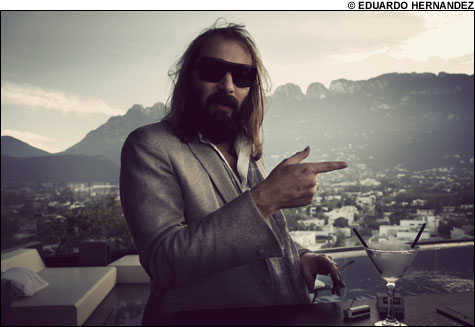
CHILD-BEARING HITS: “If people make love to my music,” says Tellier, “perhaps that means that my music can help create babies — which is a wonderful effect.” |
"The French language is perfect for talking about sex," muses hirsute Parisian singer and electronic-musician Sébastien Tellier. Over the phone from Record Makers' French office, he explains his music's slow morph from Francophone chanson to pan-linguistic Morodor stomp."French has so many perfect words for sex, and this is why it is kind of sad for me, because on this album I only did a few songs in French — the melody always chooses the language for me, and this time, they wound up being English melodies."
Said album is 2008's breakthrough international hit, Sexuality, and the irony that Tellier's 11-song ode to all things carnal would find the French language conspicuously absent is something he's been unable to avoid. The worldwide success of the album's hit single, "Divine," resulted in Tellier performing the song at last year's Eurovision Song Contest as France's representative. The sight of the tall, lanky, bearded Tellier in a white suit cavorting on stage looking not unlike John Lennon strolling across the Abbey Road cover was a sight to behold. But has he turned his back on his mother tongue? "I don't choose the language, really. I've tried every language: English, Italian, Spanish. I choose which language shines the most through the melody. If I have to learn Japanese for one of my songs, then I'll do it!"
Tellier has been fortunate in that he's been able to ride French electropop's renewed wave of popularity while carving out an individual niche as a human voice within a din of vocoders. He first came to prominence in 2001 with L'incroyable vérité ("The Unbelievable Truth"), a record of breezy and melancholy chamber pop that found him holding court with both Air (who produced the album and took him on tour with them) and Daft Punk (who used the album's slowcore masterpiece "Universe" in their Electroma film), the twin titans of France's campaign of electro-dominance. But Tellier was a horse of a different couleur: whereas his compatriots were zapping brain cells with disco apocalyptica, he was using the tools of electronica to fashion himself into a modern-day Serge Gainsbourg, with an emphasis on song and composition.
"The term 'electronic music,' now, means nothing to me, because all music is really electronic, right? What with computers and synthesizers — and even with rock music, you need computers. The thing I like is that electronic music is not the slave to a genre but rather a link between composition and technology. For me, my art and real spirit is in my composition, and these tools, this robot technology, allows me to make music with form and with artistic spirit."